剑桥少儿英语三级Flyers重要资料上下册
- 格式:doc
- 大小:67.50 KB
- 文档页数:18
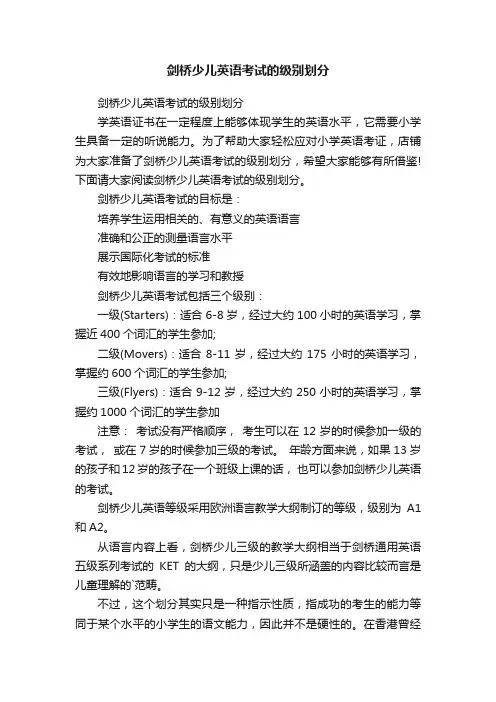
剑桥少儿英语考试的级别划分剑桥少儿英语考试的级别划分学英语证书在一定程度上能够体现学生的英语水平,它需要小学生具备一定的听说能力。
为了帮助大家轻松应对小学英语考证,店铺为大家准备了剑桥少儿英语考试的级别划分,希望大家能够有所借鉴!下面请大家阅读剑桥少儿英语考试的级别划分。
剑桥少儿英语考试的目标是:培养学生运用相关的、有意义的英语语言准确和公正的测量语言水平展示国际化考试的标准有效地影响语言的学习和教授剑桥少儿英语考试包括三个级别:一级(Starters):适合6-8岁,经过大约100小时的英语学习,掌握近400个词汇的学生参加;二级(Movers):适合8-11岁,经过大约175小时的英语学习,掌握约600个词汇的学生参加;三级(Flyers):适合9-12岁,经过大约250小时的英语学习,掌握约1000个词汇的学生参加注意:考试没有严格顺序,考生可以在12岁的时候参加一级的考试,或在7岁的时候参加三级的考试。
年龄方面来说,如果13岁的孩子和12岁的孩子在一个班级上课的话,也可以参加剑桥少儿英语的考试。
剑桥少儿英语等级采用欧洲语言教学大纲制订的等级,级别为A1和A2。
从语言内容上看,剑桥少儿三级的教学大纲相当于剑桥通用英语五级系列考试的KET的大纲,只是少儿三级所涵盖的内容比较而言是儿童理解的`范畴。
不过,这个划分其实只是一种指示性质,指成功的考生的能力等同于某个水平的小学生的语文能力,因此并不是硬性的。
在香港曾经有一位被传媒称为“神童”的六岁小童,就曾在Flyers Exam中取得最高成绩。
这不过表示该位小童的英语能力等同于一个一般的小六学生而已。
在香港,一般学校都会选取 Movers Exam 作为课外英语训练的选择,因为这个阶段的学生有一定的英语能力之余,亦不用面对公开试,所以对学生造成的压力最少,成效也最大。
剑桥少儿英语考试分为三部份内容,分别为:Reading and Writing (阅读和写作)Listening (听力)Speaking (口语)在中国大陆,本试由各大城市的大学举办;在香港,本试由英国文化协会举办。
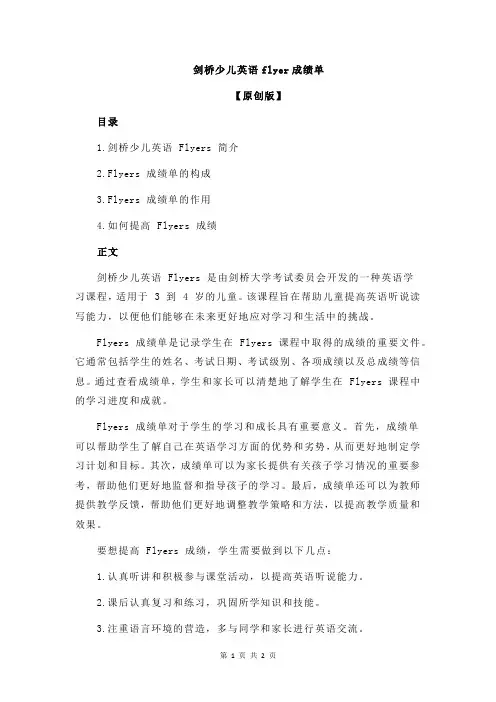
剑桥少儿英语flyer成绩单【原创版】目录1.剑桥少儿英语 Flyers 简介2.Flyers 成绩单的构成3.Flyers 成绩单的作用4.如何提高 Flyers 成绩正文剑桥少儿英语 Flyers 是由剑桥大学考试委员会开发的一种英语学习课程,适用于 3 到 4 岁的儿童。
该课程旨在帮助儿童提高英语听说读写能力,以便他们能够在未来更好地应对学习和生活中的挑战。
Flyers 成绩单是记录学生在 Flyers 课程中取得的成绩的重要文件。
它通常包括学生的姓名、考试日期、考试级别、各项成绩以及总成绩等信息。
通过查看成绩单,学生和家长可以清楚地了解学生在 Flyers 课程中的学习进度和成就。
Flyers 成绩单对于学生的学习和成长具有重要意义。
首先,成绩单可以帮助学生了解自己在英语学习方面的优势和劣势,从而更好地制定学习计划和目标。
其次,成绩单可以为家长提供有关孩子学习情况的重要参考,帮助他们更好地监督和指导孩子的学习。
最后,成绩单还可以为教师提供教学反馈,帮助他们更好地调整教学策略和方法,以提高教学质量和效果。
要想提高 Flyers 成绩,学生需要做到以下几点:1.认真听讲和积极参与课堂活动,以提高英语听说能力。
2.课后认真复习和练习,巩固所学知识和技能。
3.注重语言环境的营造,多与同学和家长进行英语交流。
4.制定合理的学习计划和目标,并定期检查和调整。
5.参加模拟考试和课外培训,以提高考试技巧和应对能力。
总之,剑桥少儿英语 Flyers 成绩单是记录学生在 Flyers 课程中取得的成绩的重要文件,对于学生的学习和成长具有重要意义。
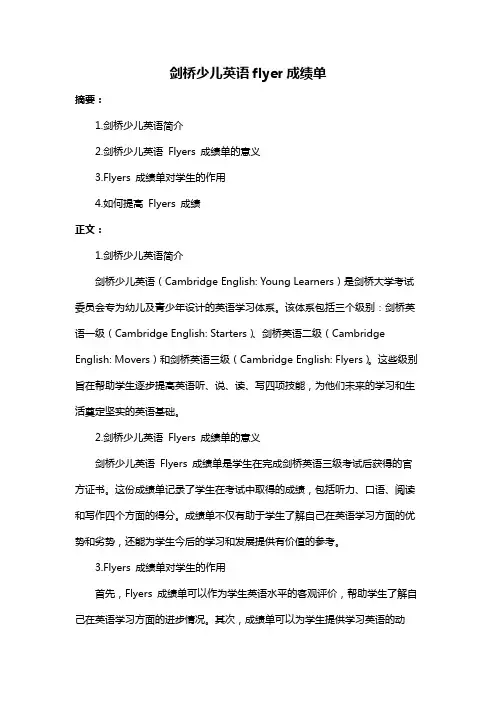
剑桥少儿英语flyer成绩单摘要:1.剑桥少儿英语简介2.剑桥少儿英语Flyers 成绩单的意义3.Flyers 成绩单对学生的作用4.如何提高Flyers 成绩正文:1.剑桥少儿英语简介剑桥少儿英语(Cambridge English: Young Learners)是剑桥大学考试委员会专为幼儿及青少年设计的英语学习体系。
该体系包括三个级别:剑桥英语一级(Cambridge English: Starters)、剑桥英语二级(Cambridge English: Movers)和剑桥英语三级(Cambridge English: Flyers)。
这些级别旨在帮助学生逐步提高英语听、说、读、写四项技能,为他们未来的学习和生活奠定坚实的英语基础。
2.剑桥少儿英语Flyers 成绩单的意义剑桥少儿英语Flyers 成绩单是学生在完成剑桥英语三级考试后获得的官方证书。
这份成绩单记录了学生在考试中取得的成绩,包括听力、口语、阅读和写作四个方面的得分。
成绩单不仅有助于学生了解自己在英语学习方面的优势和劣势,还能为学生今后的学习和发展提供有价值的参考。
3.Flyers 成绩单对学生的作用首先,Flyers 成绩单可以作为学生英语水平的客观评价,帮助学生了解自己在英语学习方面的进步情况。
其次,成绩单可以为学生提供学习英语的动力,激励他们不断提高自己的英语水平。
最后,Flyers 成绩单还可以为学生参加更高级别的英语考试,如剑桥英语高级考试(Cambridge English: Advanced)和剑桥英语熟练考试(Cambridge English: Proficiency),提供宝贵的实践经验和自信心。
4.如何提高Flyers 成绩要想提高Flyers 成绩,学生需要从以下几个方面入手:(1)加强听力训练。
学生可以通过收听英语广播、观看英语动画片等方式,提高自己的英语听力水平。
(2)提高口语表达能力。
学生应该多与同学、老师或家长进行英语对话,积累更多的英语口语表达。
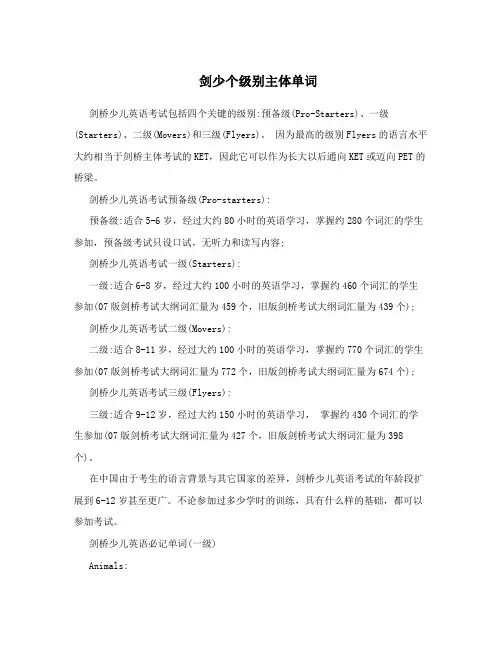
剑少个级别主体单词剑桥少儿英语考试包括四个关键的级别:预备级(Pro-Starters)、一级(Starters)、二级(Movers)和三级(Flyers)。
因为最高的级别Flyers的语言水平大约相当于剑桥主体考试的KET,因此它可以作为长大以后通向KET或迈向PET的桥梁。
剑桥少儿英语考试预备级(Pro-starters):预备级:适合5-6岁,经过大约80小时的英语学习,掌握约280个词汇的学生参加,预备级考试只设口试,无听力和读写内容;剑桥少儿英语考试一级(Starters):一级:适合6-8岁,经过大约100小时的英语学习,掌握约460个词汇的学生参加(07版剑桥考试大纲词汇量为459个,旧版剑桥考试大纲词汇量为439个);剑桥少儿英语考试二级(Movers):二级:适合8-11岁,经过大约100小时的英语学习,掌握约770个词汇的学生参加(07版剑桥考试大纲词汇量为772个,旧版剑桥考试大纲词汇量为674个);剑桥少儿英语考试三级(Flyers):三级:适合9-12岁,经过大约150小时的英语学习,掌握约430个词汇的学生参加(07版剑桥考试大纲词汇量为427个,旧版剑桥考试大纲词汇量为398个)。
在中国由于考生的语言背景与其它国家的差异,剑桥少儿英语考试的年龄段扩展到6-12岁甚至更广。
不论参加过多少学时的训练,具有什么样的基础,都可以参加考试。
剑桥少儿英语必记单词(一级)Animals:Animals动物 bird鸟 cat猫 chicken鸡 cow奶牛 crocodile鳄鱼 dog狗duck鸭子 elephant大象 fish鱼 frog青蛙 giraffe长颈鹿 goat山羊 hippo河马 horse马 lizard蜥蜴 monkey猴子 mouse老鼠 sheep绵羊 snake蛇 spider 蜘蛛 tail尾巴 tiger老虎 zoo动物园The body and faceArm胳膊 body身体 ear耳朵 eye眼睛 face脸 foot脚 hair头发 hand手head头 leg腿 mouth嘴 nose鼻子 smile微笑ClothesClothes衣服 dress连衣裙 glasses眼睛 handbag手提包 hat帽子 jacket夹克 jeans牛仔裤 shirt衬衫 shoe鞋 skirt短裙 sock短袜 trousers裤子 T-shirt T恤衫 watch手表、看 wear穿、戴 ColorsBlack黑色的 blue蓝色的 brown褐色的,棕色的 color颜色 green绿色的grey灰色的 orange橘红色的 pink粉红色的 purple紫色的 red红色的 white白色的 yellow黄色的Family and friendsBaby婴儿 boy男孩儿 brother兄弟 child孩子 cousin堂(表兄弟堂(表)姐妹dad爸爸 family家庭 father父亲 friend朋友 girl女孩儿 grandfather祖父grandma奶奶 grandmother祖母 grandpa爷爷 live居住 man男人 mother母亲mum妈妈 old年老的 people人,人们 person人 sister姐妹 woman女人 young 年轻的Food and drinksApple苹果 banana香蕉 bean豆 bread面包 breakfast早餐 burger汉堡包cake蛋糕 carrot胡萝卜 chicken鸡肉 chips炸薯条 coconut椰子 dinner正餐drink饮料,喝 eat吃 egg蛋 fish鱼 food食物 fries炸薯条 fruit水果grape葡萄 ice cream冰激凌 juice果汁 lemon柠檬 lemonade柠檬汁 lime酸橙lunch午餐 mango芒果 meat肉 milk牛奶 onion洋葱 orange橘子 pea豌豆pear梨 pineapple菠萝 potato马铃薯 rice米 sausage香肠 supper晚餐tomato西红柿 water水 watermelon西瓜The homeApartment一套公寓房子 armchair扶手椅 bath沐浴 bathroom浴室,盥洗间bed床 bedroom卧室 bookcase书架,书柜 box盒子 camera照相机 chair椅子clock时钟 computer计算机 cupboard柜橱 desk书桌 dinning room餐厅 doll 玩具娃娃 door门 flat一套公寓房子 flower花 garden花园 hall大厅 house房子 kitchen厨房 lamp灯 living room客厅 mat垫子 mirror镜子 painting画 phone电话 picture图画,图片 radio收音机 room房间sleep睡觉 sofa沙发 table桌子 television TV电视 toy玩具 tree树 wall墙watch手表 window窗户Numbers 1~20Places and directionsBehind在……之后 between在…..之间 here在这里 in在….里 in front of在…..前 next to紧挨着 on在…..之上 park公园 shop商店 store商店street街道 there在那里 under在…..下 SchoolAlphabet字母表 answer回答 ask问 board黑板 book书 bookcase书架,书柜 class班级 classroom教室 close关 color颜色 computer计算机 correct正确的 cross叉 cupboard柜橱 desk书桌 door门 draw画 English英语 eraser 橡皮 example例子 floor地面,地板 find找到,发现 know知道,理解 learn 学习 letter字母,信 line线,列 listen听 look看 number数字 open打开page页 part部分 pen钢笔 pencil铅笔 picture图画,图片 playground操场question问题 read读 right对的,正确的 rubber橡皮 ruler尺子 school学校sentence句子 spell拼写 story故事 teacher教师 tell告诉,说 test试验,测试 tick画勾 understand理解 wall墙 window窗户 word字,词 write写Sports and leisureBadminton羽毛球 ball球 baseball棒球 basketball篮球 beach海滩 bike 自行车 boat小船 book书 bounce反弹,跳起 camera照相机 catch抓住 doll玩具娃娃 draw画 drawing图画 drive开车 enjoy喜爱 favorite喜爱的 fish鱼fishing钓鱼 fly飞 football足球 game游戏 guitar吉他 hit打,击 hobby业余爱好 hockey曲棍球 jump跳 kick踢 kite风筝 listen听 paint油漆,画painting画 photo照片 piano钢琴 picture图画,图片 play玩 radio收音机read读 ride骑 run跑 sing唱歌 soccer足球 song歌曲 story故事 sport运动table tennis乒乓球 television/TV电视 tennis网球运动 toy玩具 watch手表,看TimeAfternoon下午 birthday生日 clock时钟 day天,白天 evening晚上morning早晨,上午 night夜晚 today今天 watch手表ToysBall球 baseball 棒球basketball篮球 bike自行车 car汽车 doll玩具娃娃 football足球 game游戏 helicopter直升飞机 kite风筝 lorry卡车monster怪物 plane飞机 robot机器人 toy玩具 train火车 truck卡车TransportBike自行车 boat小船 bus公共汽车 car汽车 fly飞 go去 helicopter直升飞机 lorry卡车 motorbike摩托车 plane飞机 ride骑 run跑 swim游泳 train 火车 truck卡车 Weather Sun太阳Work Teacher教师The world around usBeach海滩 sand沙子 sea海洋 shell贝壳 street街道 sun太阳 tree树water水剑桥少儿英语必记单词(二级)Animals:Animal bat bear bird cage chicken cow crocodile dog dolphin duck elephant fish fly frog giraffegoat hippo horse kangaroo kitten lion lizard monkey mouse panda parrot pet puppy rabbit sharksheep snake spider tail tiger whale zooThe body and face:Arm back beard blonde body curly ear eye face foot hair hand head leg moustache mouth necknose shoulder smile stomach straight toothClothes:Clothes coat dress glasses handbag hat jacket jeans scarf shirt shoe skirt sock sweater trousersT-shirt watch wearFamily and friendsaunt baby boy brother child cousin dad daughter family father friend girl grandfather granddaughtergrandma grandparent grandson live man mother mum old parent people person sister son unclewoman youngFood and drinks:Apple banana bean bottle bowl bread breakfast burger cake carrot cheese chicken chips coconutcoffee cup dinner drink eat egg fish food fries fruit grape ice cream juice lemon lemonade limelunch mango meat milk onion orange pasta pea pear picnic pineapple potato rice sandwichsausage soup supper tea thirsty tomato vegetable water watermelon Health:Cold cough dentist doctor earache fine headache hospital hurt nurse matter stomachache temperaturetoothacheThe home:Address apartment armchair balcony basement bath bathroom bed bedroom blanket bookcase boxcamera chair clock computer cupboard desk dinning room doll door flat floor flower garden hallhome house kitchen lamp lift living room mat mirror painting phone picture radio room sleep sofastair table television toothbrush towel toy tree upstairs wall wash watch windowNumber21~100stth1~20Places and directionsAbove bank behind between bus station café cinema farm here hospital in library in front of marketnext to on park place playground road shop square store straight street supermarket swimming poolthere under zooSchoolAlphabet answer ask board book bookcase class classroom close colour computer correct crosscupboard desk door draw English eraser example floor find homework know learn lesson letterline listen to look mistake number open page part pen pencil picture playground question readright rubber ruler school sentence spell story teacher tell testtext tick understand wall windowword writeSports and leisureBadminton ball baseball basketball bat beach bike boat book bounce camera catch doll drawingdrive enjoy favourite fish fishing film fly football game guitar hit hobby hockey holiday jumpkick kite listen to movie music painting party photo piano picture play present radio read riderun sing skate soccer song sport story table tennis television tennis throw toy video watchcomic/comic bookTimeAfter afternoon always before birthday clock day end evening every morning never night sometimestoday watch yesterday Sunday Monday Tuesday Wednesday Thursday Friday SaturdayTransportBike boat bus bus station car catch a bus take a bus drive driverfly go helicopter lorry motorbikeplane ride run swim train truckWeatherCloud cloudy rain rainbow snow sun sunny weather wind windyWork Clown doctor farmer nurse pirate teacher work The world around usBeach city country field forest grass ground island jungle lake leaf moon mountain plant riverroad rock sand sea shell star street sun town tree village water waterfall world剑桥少儿英语必记单词(三级) Animalsbutterfly camel dinosaur swan fur(某些动物的)浓密的软毛 insect octopus wingFamily,friendshusband married surname wifeThe homecomb brush cooker dairy envelope fridge key letter shelf soap stamp swing telephone toiletclothesbelt glove ring shorts spot spotted (adj.) striped (adj) tights (裤袜);umbrella uniformfood,drinksbiscuit(US cookie)butter chocolate flour fork jam knife meal pepper pizza plate smell salt snack spoon sugar taste sweet(s) (US candy) MaterialsCard(厚纸片) glass gold metal paper plastic silver wood woolColoursgold silver spot stripeHealthill n.,adj medicine chemist (chemist’s) (药房)Numbersstst21~31Places,directionsbookshop airport bridge bus stop castle circus(马戏团)club college corner east west end factoryfire station front get to hotel kilometre (s) kilometer (s) left right London museum north Southover(prep.) way Police station restaurant post office station straight on(一直)theatre universitySchoolart bin competition dictionary exam(examination) flag geography glue group historylanguage math rucksack (帆布背包) science scissors student subject Sports,leisuredrum flashlight(手电筒) golf magazine player programme (US program) pyramid(金字塔) racescore ski sledge snowman snowball suitcase tape recorder team tent torch(手电筒) volleyballWorkactor /actress ambulance artist astronaut business businessman/woman cook dentist engineerfireman/woman footballer job journalist mechanic(机械师) meeting news newspaper office painterphotographer pilot policeman/woman Queen secretary singer tennis player waiterTransportbicycle fire engine(救火车) rocket taxi trafficThe world around usair cave desert environment future hill planet sky spaceWeatherfog foggy(adj.) ice stormTimea.m( p.m. gao(adj.) autumn century Christmas date early half hour late(adv.) later(adv.) midday midnight minute month o’clock (adv) past(prep.) quarter spring summer timetomorrow tonight week weekend winter yearThe months of the yearJanuary February March April May June July August September October November December。
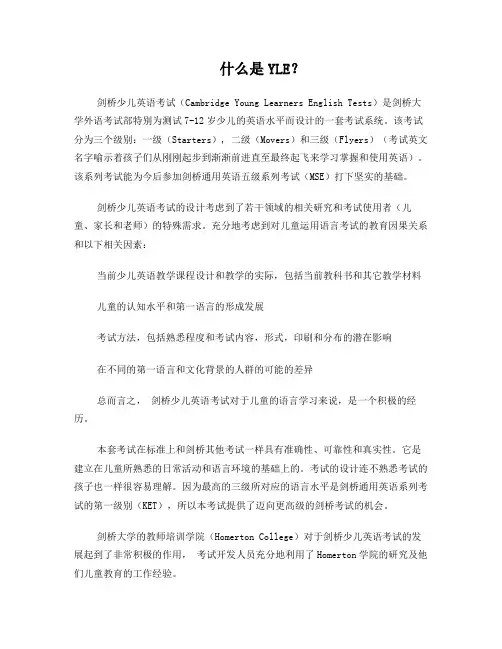
什么是YLE?剑桥少儿英语考试(Cambridge Young Learners English Tests)是剑桥大学外语考试部特别为测试7-12岁少儿的英语水平而设计的一套考试系统。
该考试分为三个级别:一级(Starters), 二级(Movers)和三级(Flyers)(考试英文名字喻示着孩子们从刚刚起步到渐渐前进直至最终起飞来学习掌握和使用英语)。
该系列考试能为今后参加剑桥通用英语五级系列考试(MSE)打下坚实的基础。
剑桥少儿英语考试的设计考虑到了若干领域的相关研究和考试使用者(儿童、家长和老师)的特殊需求。
充分地考虑到对儿童运用语言考试的教育因果关系和以下相关因素:当前少儿英语教学课程设计和教学的实际,包括当前教科书和其它教学材料儿童的认知水平和第一语言的形成发展考试方法,包括熟悉程度和考试内容,形式,印刷和分布的潜在影响在不同的第一语言和文化背景的人群的可能的差异总而言之,剑桥少儿英语考试对于儿童的语言学习来说,是一个积极的经历。
本套考试在标准上和剑桥其他考试一样具有准确性、可靠性和真实性。
它是建立在儿童所熟悉的日常活动和语言环境的基础上的。
考试的设计连不熟悉考试的孩子也一样很容易理解。
因为最高的三级所对应的语言水平是剑桥通用英语系列考试的第一级别(KET),所以本考试提供了迈向更高级的剑桥考试的机会。
剑桥大学的教师培训学院(Homerton College)对于剑桥少儿英语考试的发展起到了非常积极的作用,考试开发人员充分地利用了Homerton学院的研究及他们儿童教育的工作经验。
目前,参加剑桥少儿英语考试的儿童遍及55个国家和地区,考生人数逐年递增。
YLE的级别剑桥少儿英语考试的目标是:培养学生运用相关的、有意义的英语语言准确和公正的测量语言水平展示国际化考试的标准有效地影响语言的学习和教授剑桥少儿英语考试包括三个级别:一级(Starters):适合6-8岁,经过大约100小时的英语学习,掌握近400个词汇的学生参加;二级(Movers):适合8-11岁,经过大约175小时的英语学习,掌握约600个词汇的学生参加;三级(Flyers):适合9-12岁,经过大约250小时的英语学习,掌握约1000个词汇的学生参加注意:考试没有严格顺序,考生可以在12岁的时候参加一级的考试,或在7岁的时候参加三级的考试。
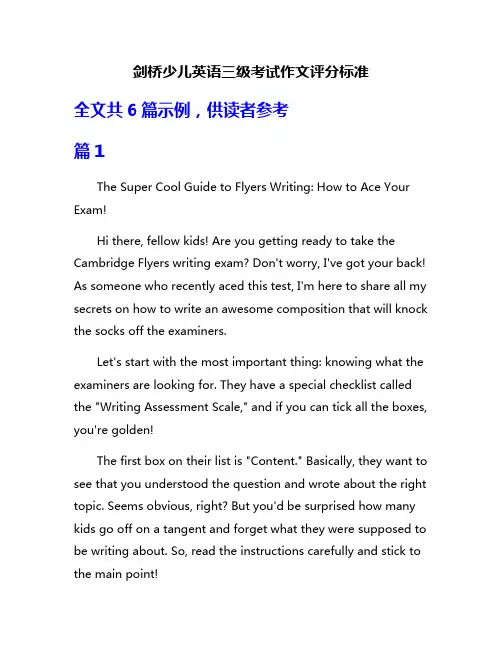
剑桥少儿英语三级考试作文评分标准全文共6篇示例,供读者参考篇1The Super Cool Guide to Flyers Writing: How to Ace Your Exam!Hi there, fellow kids! Are you getting ready to take the Cambridge Flyers writing exam? Don't worry, I've got your back! As someone who recently aced this test, I'm here to share all my secrets on how to write an awesome composition that will knock the socks off the examiners.Let's start with the most important thing: knowing what the examiners are looking for. They have a special checklist called the "Writing Assessment Scale," and if you can tick all the boxes, you're golden!The first box on their list is "Content." Basically, they want to see that you understood the question and wrote about the right topic. Seems obvious, right? But you'd be surprised how many kids go off on a tangent and forget what they were supposed to be writing about. So, read the instructions carefully and stick to the main point!Next up is "Communicative Achievement." Fancy words, I know, but it just means they want to see that you can communicate your ideas clearly. Use simple language that gets your message across without confusing the reader. Imagineyou're explaining something to your little cousin – that's the level of clarity you're aiming for.Now, let's talk about "Organization." This is where you show off your mad structuring skills. Your writing should have a clear beginning, middle, and end, with each paragraph flowing smoothly into the next. It's like building a sandcastle – you start with a solid base, add some cool towers in the middle, and top it off with a fancy flag (or a conclusion, in this case).The "Language" category is all about your vocabulary and grammar. Here's where you get to show off all those fancy words you've been learning in class. But don't go overboard – the examiners want to see that you can use the right words and structures accurately, not just string together a bunch of big words that don't make sense.Last but not least, we have "Mechanics." This is where they check if you can spell, use punctuation correctly, and write neatly. It might seem like a small thing, but trust me, it can make a big difference in your score.Now that you know what the examiners are looking for, let me share some pro tips that will help you ace this exam like a boss:Plan, plan, plan! Before you start writing, take a few minutes to jot down your ideas and organize your thoughts. This will make your composition flow much better and help you stay on track.Use examples and details. Don't just write general statements – back them up with specific examples and descriptions. This will make your writing more interesting and show the examiners that you really understand the topic.Check your work. Once you've finished writing, take a few minutes to read through your composition and look for any mistakes or parts that don't make sense. It's like giving your sandcastle a final pat-down before showing it off to the judges.Use vocabulary from the exam topics. The examiners love seeing that you've learned the words and phrases related to the topics covered in the exam. Sprinkle in a few fancy vocab words here and there, but don't overdo it.Have fun with it! Writing doesn't have to be a chore – think of it as an opportunity to let your creativity shine. Use yourimagination and write something that will make the examiners smile (or at least nod approvingly).Well, there you have it, my friends – the ultimate guide to rocking the Flyers writing exam. Just remember to follow these tips, and you'll be well on your way to writing a composition that will make the examiners say, "Wow, this kid is going places!"Good luck, and happy writing!篇2Writing Awesome Stories for the Movers ExamHey there, fellow young writers! Are you getting ready to take the Cambridge Movers exam? If so, you might be wondering what the examiners are looking for when they read your amazing stories. Well, have no fear – I'm here to break it down for you in a way that's easy to understand. Buckle up, grab your favorite pencil, and let's dive into the world of writing awesome stories that'll knock the examiners' socks off!First things first, let's talk about the basics. When you're writing your story for the Movers exam, you'll need to cover all the important parts: the beginning, the middle, and the end. That's right, just like the stories you read in your favorite books,your tale needs to have a clear structure with a proper introduction, a juicy middle section, and a satisfying conclusion.In the introduction, you'll want to set the scene and introduce the main characters. Who are the key players in your story? What's the setting? Maybe it's a enchanted forest, a bustling city, or even a faraway planet – the choice is yours! Just make sure you give your readers enough details to paint a vivid picture in their minds.Once you've hooked your readers with an exciting opening, it's time to dive into the meaty middle section. This is where the real action happens, and you'll need to keep your readers engaged with a series of events or challenges that your characters must overcome. Perhaps your brave hero has to face a fearsome dragon, or your clever detective has to solve amind-bending mystery. Whatever your story's plot, make sure it's packed with twists, turns, and plenty of suspense to keep your readers on the edge of their seats.But wait, there's more! As you're crafting your thrilling tale, don't forget to sprinkle in some juicy details and descriptions. The examiners love it when writers use a wide range of vocabulary and really bring their stories to life with vivid imagery. Describe the sights, sounds, smells, and emotions yourcharacters are experiencing – it'll make your story even more immersive and engaging.And now, we've reached the final act: the conclusion. This is where you'll need to tie up any loose ends and leave your readers with a sense of satisfaction. Did the hero save the day? Did the detective crack the case? Whatever the outcome, make sure it's logical and fits seamlessly with the rest of your story.But that's not all! The examiners will also be looking at your language skills, so it's important to use a variety of sentence structures and show off your grasp of grammar, punctuation, and spelling. Don't worry if you make a few mistakes here and there – the examiners understand that you're still learning. Just do your best to keep your writing clear, coherent, and easy to follow.Last but not least, let's talk about length. For the Movers exam, you'll need to write a story that's between 100 and 120 words long. That might seem like a lot, but with a little practice and some clever planning, you'll be able to craft a captivating tale that fits within those parameters.So, there you have it, my fellow young writers – the secrets to penning a stellar story for the Movers exam. Just remember to have fun with it, let your imagination run wild, and mostimportantly, keep practicing. Before you know it, you'll be churning out tales that'll leave the examiners in awe and earn you top marks!Happy writing, and may the words be with you!篇3Cambridge Young Learners: Grading the Flyers Writing ExamHi there! My name is Lily and I'm a 3rd grader. I just took the Cambridge Young Learners English exam for the Flyers level and wanted to share what I learned about how the writing section is graded. It was a bit tricky but I tried my best!The writing exam for Flyers has two parts. For Part 1, we had to write a short story based on some picture prompts. Part 2 was writing about a topic they gave us. I'll explain how each part is graded.Grading Part 1: The StoryFor the story in Part 1, there are four areas the graders look at:ContentThis is about if you understood the task and storyline from the pictures. Did your story make sense and match what was happening in the pictures? The graders want to see that you can write a clear story based on the prompts.Communicative AchievementThis looks at how well you can communicate meanings through your writing. Even with some mistakes, did your story get the main points across in an understandable way? The graders want your writing to be coherent and achieve its purpose.OrganizationOrganization means how well you structured and linked your ideas together into a story. Did you use paragraphs and connecting words appropriately? A well-organized story flows logically from one event to the next.LanguageThis criteria focuses on your use of grammar, vocabulary, spelling, and punctuation. The graders have set expectations for what Flyers students should be able to use accurately at this level. Having some minor errors is okay, as long as it doesn't really impact clarity.For each of those areas, you can score up to 5 points. So the maximum score for the story in Part 1 is 20 points total.Grading Part 2: The TopicFor Part 2 where we wrote about a topic, the grading is a bit different. There are only three areas looked at:ContentThis time, content means if you covered all the key points required by the topic prompt. Did you fully answer what was asked and provide relevant information and opinions? Leaving out important parts will lose points.Communicative AchievementJust like in Part 1, this looks at how successfully you conveyed your meanings through writing. The graders want your ideas to be clear and understandable overall.OrganizationAlso similar to Part 1, organization is about logically structuring your writing into paragraphs with proper linking words and cohesion between sentences.There is no separate "Language" criteria for Part 2. Instead, points can be deducted from the other three areas if yourgrammar, vocab, spelling etc. is very poor and really interferes with comprehension.For this part, each of the three areas can score up to 7 points maximum. So the highest possible score for the topic writing in Part 2 is 21 points.When you combine the scores for Part 1 and Part 2, the total writing score is out of 41 points altogether.The graders have guidelines for what score ranges mean what level of performance:0-15 points = Did not pass. Need more practice with writing skills.16-22 points = Pass at some level, but writing is not very developed yet. Keep working on it!23-32 points = Pass solidly. Writing is understandable and meets expectations for this level.33-41 points = Passed with flying colors! Writing is very effective and advanced for Flyers.Those are the basics for how writing is graded on the Flyers exam. It helped me to understand what the graders are looking for. Even though I made some mistakes, I think my stories andtopic writing showed I can communicate through my English writing abilities. Finger's crossed I did well!The grading seems pretty fair overall. It makes sense they have different criteria for story writing vs topic writing. And splitting it into different areas like content, organization, language etc. allows them to look at different skills separately.I feel like the hardest areas for me were probably organization and language accuracy. Putting all my ideas together into a structured story or essay was definitely challenging. And even though I've learned a lot of English vocabulary and grammar rules, actually applying it all properly in writing is way harder than just memorizing it!I remember in my preparation classes, my teacher had us do lots of practice writing stories from pictures and responding to prompts. She would go through examples from previous tests and explain what kinds of things get good scores or low scores based on the grading areas. That helped me get a better sense of what is expected.Some of her tips were:• Always read all the instructions carefully and plan your writing before starting• Use paragraphs and linking words (like "first", "then", "in addition", etc.) to organize ideas• Try to include descriptive details and examples to ma ke your writing more interesting• Use a variety of vocabulary words and sentence structures, not just repeating the same ones• Make sure to proofread your work to fix any silly grammar or spelling mistakesShe said the key things graders don't like are totally missing the point of the task, writing that is way too short, or writing that is just a big jumble of incomplete sentences and fragments. As long as you make a decent effort and your writing is understandable, you should be able to pass at the Flyers level.Anyway, that's my overview of the Flyers writing criteria! I tried to explain it as best as I could. Hopefully it gave you a clear picture of how this part of the exam is graded. Writing in English is hard work but super important for improving your skills. With practice, I know all that grading stuff will start to make even more sense too.Let me know if you have any other questions! I'm happy I could share what I've learned about the Cambridge writing exam scoring. Thanks for reading, and happy studying!篇4Marking the Cambridge Flyers Exam: A Kid's GuideHi there! My name is Jamie and I'm going to tell you all about how the writing part of the Cambridge Flyers English exam gets marked. The Flyers is a test for kids around 7-9 years old who are learning English. Getting good marks on the writing section can be tricky, but if you know what the examiners are looking for, it gets a whole lot easier!The writing part has two tasks – you have to write a story for one, and then either an email, an article or some other short text for the other task. For both parts, there are four main things the examiners look at when giving you a mark out of 5. Let me break it down for you:Task AchievementThis one is all about answering the question properly and giving all the information it asks for. For the story, you need to cover all the prompts or picture ideas they give you. If they tellyou to write about a kid who finds some treasure, you better include that treasure in your story!For the second task like an email, you have to include all the content points they list out. If it says to give your name, age and a description of your best friend, you need all three of those details or you'll lose marks.The examiners want to see that you can understand the instructions and put in all the relevant information. If you miss bits out or go off in a completely different direction, your task achievement score won't be so great.GrammarThis one is pretty obvious – they look at whether you're using verbs, nouns, adjectives etc correctly. Things likesubject-verb agreement, tenses, plurals and all that grammar ninja stuff. You don't have to be perfect, but the more grammar mistakes you make, the lower this part of your score.The examiners are okay with slightly simple "kid grammar" at this level as long as you're using basic concepts properly. So don't stress about using mega complex grammar structures –get the basics right and you'll be doing well!VocabularyHere the examiners check if you're using English words correctly and if you have enough variety in your word choices. You can't just use the same old basic words for everything! They want to see that you know more descriptive and interesting vocabulary.Using the wrong words entirely or just repeating the same few words over and over will lose you marks here. But using some fancier adjectives, sprinkling in vocabulary related to the topic and avoiding too much repetition will get you bumped up.Coherence and CohesionThis one is all about organization and flow. For the story task, the examiners look at whether your ideas are logically connected and all tie together in a clear sequence. Did you use words like "first, then, after that" to guide the reader through the events? Or did you just jumble everything up randomly?For the second task like an email, coherence is about all your sentences sticking to the same main idea and being grouped together logically. Cohesion looks at whether you're using linking words and phrases to join your sentences together nicely.The examiners don't want to see a big jumbled mess with no organization or connections between thoughts. Awell-structured piece of writing with good flow and linking words/phrases scores much better here.Those are the four criteria! Of course, examiners look at other things too like your spelling, punctuation and handwriting. But those bigger four areas are the main ones that decide your score for each writing task.My top tips would be:Read the instructions super carefully and make sure you answer everythingUse a range of vocabulary and avoid just repeating basic wordsPractice using grammar properly, especially verbs and tensesFor stories, plan out a clear beginning, middle and end sequenceFor other writing, group your ideas logically into paragraphs and use linking wordsIf you work on those areas, you'll be well on your way to getting an awesome score on the writing part of Flyers! It might seem tough now, but the more you practice, the easier it gets. Just try your best and you'll do great.Okay, that's all from me! I hope this kid's guide has helped explain what the examiners want to see. Getting full marks on the writing might feel like a huge challenge at first, but remember that it's just practicing some key skills. Keep working hard and you'll smash that Flyers exam for sure!篇5The Super Important Grading Rules for the Cambridge Flyers Exam WritingHi there! My name is Jamie and I'm going to tell you all about how the writing part of the Cambridge Flyers English exam gets graded. The Flyers is an exam for kids around 9 years old who are learning English. The writing section is pretty important because it shows if you can communicate your ideas by putting words and sentences together properly.There are four areas the examiners look at when grading your writing: Content, Communicative Achievement, Organization, and Language. Let me explain each one!ContentFor content, the examiners want to see that you did the writing task you were asked to do. If the question was to write astory about your favorite toy, you can't write about your summer vacation instead! You need to stick to the topic.You also get higher scores if you have interesting, original ideas and details in your writing. The examiners don't want just basic, obvious stuff. Describe things in a creative, imaginative way to impress them!Communicative AchievementThis funky term just means how well you got your message across and if it would make sense to the reader. Your writing should clearly communicate your ideas without confusing the person reading it.To get high marks, use language that is appropriate for the situation. For example, you probably wouldn't write super formally if describing a silly event with your friends. Match your tone and style to the topic.The examiners also want to see you using reasons, examples and explanations, not just simple sentences. Showing you can develop and support your ideas is important.OrganizationThis area is all about structure - how logically and coherently you organized your writing. A good piece of writing flows smoothly from one idea to the next in a way that's easy to follow.Using paragraphs, connecting words like "also, however, for example", and having an introduction and conclusion helps a lot with organization. Planning your writing before you start can really help make it structured and well put together.Another key thing is staying focused and not going off on random, unrelated tangents. Stick to the main idea and develop it throughout your writing.LanguageLast but definitely not least, the examiners look at your skills with grammar, vocabulary, spelling and punctuation. This shows your overall command of the English language.For grammar, try to use a range of different sentence structures - some simple, some more complex. Accurate verb tenses, word order, articles, etc. are also crucial.With vocabulary, using richer, more interesting word choices gets higher scores than really basic words. But don't use words you don't fully understand! That can make more mistakes.Spelling is an obvious one - take care to spell words correctly, especially common words. Using punctuation like periods, commas, etc. in the right places is also important.Finally, the examiners consider your handwriting and how neatly and clearly you write. If they can't read your scribbles, that won't help your score!So those are the four main areas the writing gets evaluated on. By understanding what the examiners want to see, you can work on improving in each area. Practice writing on different topics while keeping those criteria in mind.The most important thing is to convey your ideas in an interesting, well-organized way while showing off your awesome English skills. Keep working hard and you'll do great on that writing test! Let me know if any part of the grading criteria confuses you. Good luck!篇6The Writing Exam: What the Teachers Are Looking ForHi there! My name is Emma and I'm going to tell you all about the writing part of the Cambridge Movers English test. Ijust took it last week and I've learned a bunch about how it gets marked.The writing section has two parts. In Part 1, you have to write a short story based on some pictures they give you. In Part 2, you get asked to write something like a letter, an email, a review, or instructions. Pretty neat, right?For the story in Part 1, the examiners (that's what they call the teachers marking the tests) have a few key things they look at. First up is Reading the Task. This means following the instructions carefully and including all the pictures and perspectives in your story. If the question says to write about a boy playing football, you can't go off writing about a girl baking cupcakes!The next thing is Task Fulfillment. That's making sure your story is relevant and has a clear beginning, middle, and end. It should make sense as a whole story. The examiner also checks that your story contains descriptive language like adjectives and adverbs to make it more interesting.Organization is another biggie. Your writing needs to be organized into paragraphs, with linking words and phrases to connect the ideas together. Think words like "first", "next", "after that", "finally". It's kind of like having a road map for your story!They also look at Language Range, which means using a good variety of grammar structures and vocabulary words that you've learned. Using simple sentences like "I went to the park. I played football." over and over again isn't going to impress the examiners much!The last area for the story is Accuracy, where they check that your spelling, punctuation, grammar, and sentence structure is all correct and error-free. This part is super important.For Part 2 of the writing, whether it's a letter, review, or whatever, many of the same criteria apply. But there are a couple extras too.One is Format, which means setting out your writing properly for the type of text it is. Like putting a date and greeting at the top if it's a letter. Or having headings and numbered points if they're instructions.The other new element is Content, where the examiners check that you've included all the required information and developed your ideas fully. For a review, you might need to describe the story, main characters, best part, what you liked or didn't like, and give a final recommendation. Leaving out big chunks would not be good!As well as those main areas, the examiners look at things like complexity and ambition when they award the final mark. Did you attempt to use more advanced vocabulary and grammar structures? Did you express your ideas clearly and in an interesting way? The higher the level you can demonstrate in each criteria, the higher your score will be.Those are the main things that get assessed in the Cambridge writing test. Sure, it might sound like a lot to remember. But the great thing is that if you practice writing regularly using the same criteria, it'll become second nature.The most important advice I can give is:Always read the instructions super carefullyPlan out your writing before you start so it has a clear structureUse a range of vocabulary and grammarCheck over your work and fix any mistakesIf you can do all that, you'll be well on your way to getting an awesome score! Writing can be challenging, but keeping these marking criteria in mind will set you up for success. Just stay focused, give it your best effort, and you'll do great!Well, that's my explanation of what the writing examiners are looking for. I hope it's helped give you a better understanding. Let me know if you have any other questions! Good luck with your writing practice.。
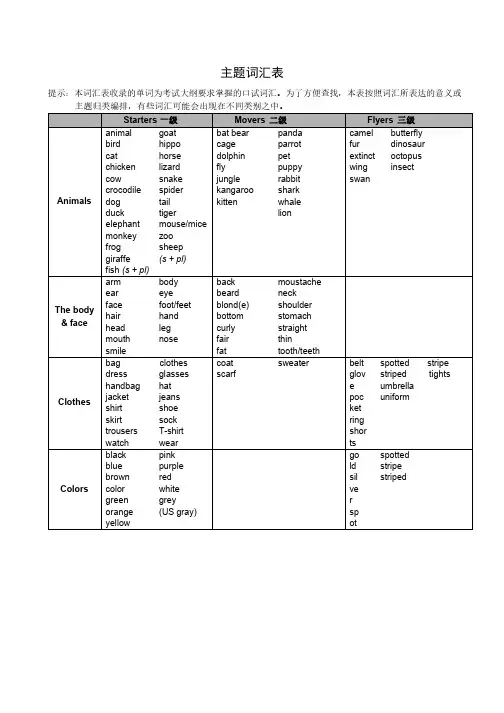
主题词汇表提示:本词汇表收录的单词为考试大纲要求掌握的口试词汇。
为了方便查找,本表按照词汇所表达的意义或主题归类编排,有些词汇可能会出现在不同类别之中。
Family& friends baby liveboy man/mencousin motherbrother mum(my)child oldchildren sisterdad(dy)youngfamily personfather peoplefriend grandmagirl womangrandpa womengrandfathergrandmotherauntdaughtergranddaughter grandparentgrandsongrown-up parentsonunclemarriedwifehusbandsurnameFood& drink applebananabeanbreadbreakfastburgercakecarrotdrinkeateggfishfoodchickenfruitgrapecoconutdinnerjuicelemonlemonadelimelunchmangomeatmilkonionorangepeapearpineapplepotatoricesausagesuppertomatowaterwatermelonice creamchipsfriesbottlebowlcheesecoffeecupglasshungrypastapicnicsaladsandwichsouptea thirstyvegetablebuttertasteflourforkjamknifemealpepperpiecepizzaplatesaltsmell snackspoon sugarsweet(s)candyCookiebiscuitchocolatechopsticksHealth cold hurtcough tiredcry nursedoctor headacheearache hospitalfine toothachetemperature stomach-achematter(What’s the matter?)cutdentistillfall fall overmedicine chemistchemist’sThe home armchairbathbathroombedbedroombookcaseboxlampwindowliving roomwatchmatmirrorpaintingaddressbalconybasementblanket CDplayerfandownstairsfloorliftelevatorshowerstair(s)toothbrushtowelbrushcombcookerdiaryfridgekeyletterenvelopeshelfsoapstampswingtelephonetoiletcamera phone dreamupstairs chair picture DVD player washclock radio homecomputer room cupboard sleep desk sofa dining tableroom television doll TV door toy flower tree garden wall hall flathouse apartmentkitchenMaterialscard glass gold metal paper plastic silver wood wool NamesAlex Ann Anna Ben Bill Jill Kim Lucy May Nick Pat Sam Sue Tom TonyDaisy Fred Jack Jane Jim JohnMary Paul Peter Sally VickyBetty David Emma Harry Helen KatyMichael Richard Robert SarahWilliamNumbers1–2021–1001st–20th 101–1,00021st–31st Places behind playground above farm airport bus stop between street bank hospital bridge bookshop here park below market castle chemist(’s)inthere road near circus London in front of under bus station square club museum next toonmap straight college north shop (US store)store (UK shop)cafélibrary placeopposite cinema corner south east over&end police station directionsswimming pool sports centre factory fire station way post office supermarketfront rightget to restaurant hotel station left theatre west straight on university Schoolalphabet answer ask board listen look number openhomework textmistakeart bin club collegelanguage science scissors shelfbook bookcase class classroom close color computer correct cross cupboard desk door draw English eraser rubber example floorfind know learn lesson letterline pagepartpenpencilpictureplaygroundquestionreadrulerrightunderstandschoolsentencesit(down)spellstand(up)tickstoryteachertelltestwallwindowwordwriteexamflagsubjectgluegrouphistorystudentdictionaryrucksackgeographystudyteachuniversitymaths(US math)competitionSports&ball badminton bat kick(n)drum magazine baseball football cinema sail diary pyramid beach play CD party golf swing basketball radio CD player present hotel ski(n+v) bike read comic ride(n)meet recorder boat ride(v)comic book skip player umbrella book run dance skate race volleyball bounce sing drive(v)swimming score torch camera sport DVD sports centre sledge flashlight catch soccer DVD player towel snowb programme doll song email swim(v)tape rucksack draw(ing)watch fish pool team snowman drive(v)story go film movie tent suitcaseleisure enjoy swim(v)shopping video favorite table hop walk(n)fishing tennis holidayfly take a photo musicgame pictureguitar tennishit texthobby throwhockey toyjump walk(v)kick(v)television/TVkite pianolisten picturepaint(ing )photoTime afternoonclockendmorningtodaybirthdaydayeveningnightwatchweekendyesterdaySundayMondayTuesdayThursdayFridaySaturdayWednesdayafteralwaysbeforeeveryneversometimesweeka.m.midnightago summerautumn timecentury Christmasyear tomorrowdate tonightearly winterfuture pasthalf Januaryhour Februarylate Marchlater Aprilmidday MayminuteJunemonth Julyo’clock Augustp.m.Septemberquarter Octoberspring NovemberDecemberToys ballbaseball basketballbikeboatcargamehelicopter monsterplanerobottoytraindollfootballsoccerlorrytruckkiteTransport bikeboatbuscardrive(v)flygohelicoptermotorbikeplane ride(v)runswimtraintrucklorrybusstationdrive(n)driverride(n)ticketairportbicyclefireenginetrafficrocketambulance stationtaxiWeather sun cloudcloudyrainrainbowsnowsunnyweatherwindwindyfogicestormfoggyskyWork teacher clowndoctordriverfarmerhospitalnursepirateworkactor ambulanceairport astronautartist businesscook engineercircus footballerdentist fireworkengine journalistfactory mechanicfire meetingfiremannewspaper job officeman painterrocket pilotqueen waitertaxi police stationsinger secretarypolicemanpolicewomanphotographerbusinessmanThe world around us beach sand city moon air planet sea shell country mountain bridge pyramid street sun countryside plant castle sky tree water field river cave spaceforestgrassgroundroadrockstardesertfirefuturewoodhillisland town environmentjungle villagelake waterfallleaf/leaves world。

剑桥少儿英语等级考试剑桥少儿英语考试(YLE),这个考试具体考什么?到底有什么含金量?1小学阶段孩子适合考一些什么类型的英语证书?答:小学阶段,除了美国系列教材的培训,最被认可的英语证书恐怕就是剑桥英语等级证书了,如KET、PET、FCE。
讲真,如果你家孩子在小学毕业前就考完了FCE,那么,她的择校完全不用你担忧了......2我们曾报考剑桥少儿英语一级,这与KET、PET、FCE等有什么差别?答:剑桥少儿英语考试与剑桥五级考试(KET、PET、FCE、CAE、CPE)其实都是剑桥的考试,它们属于一个系统的考试。
3剑少与KET等英语考试有哪些共同的特征?1.考试题型有一部分是相同的。
剑桥少儿英语考试和KET、PET考试有部分的题型是相同的。
例如:剑桥少儿英语三级考试中有补全对话,同样在KET考试中也有补全对话,其形式一样。
还有开放式完型填空,同样出现在剑桥少儿英语三级考试和KET考试中。
2.考试侧重点是相同的。
在语法的基础上都是考实际运用能力,例如:在剑桥少儿英语成绩单后面有:一级(Starters):有能够理解网上基本的英语内容,阅读英文书籍,欣赏英文歌曲、电视和电影的能力。
二级(Movers):有能够理解基本的指示或参与简单的对话,理解基本的通知、指示或信息的能力;三级(Flyers):有能够与语速缓慢、表达清晰的英语母语者互动的能力。
KET:在特定的范围内与nativespeaker交谈的能力;PET:有在国外独立生活得能力。
3.考试的难度是递进的。
从词汇,时态,和文章难度都是递进的,剑桥少儿英语是基础,是学习剑桥五级最初的起步。
而剑桥五级尤其是FCE证书现在已经成为很多重点中学的敲门砖,但这一切的基础都是剑桥少儿英语,学习剑桥少儿英语课程,是提高英语、培养英语思维方式最合适的教材。
4剑桥英语等级考试剑桥少儿英语等级剑桥少儿英语等级考试分为三个级别:一级(Starters),二级(Movers)和三级(Flyers)。
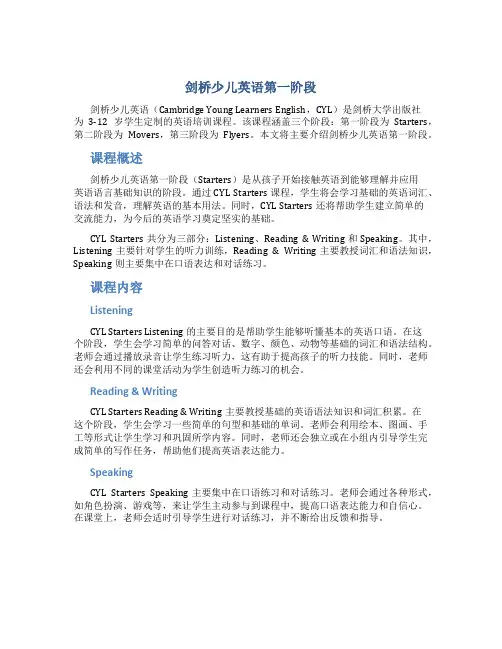
剑桥少儿英语第一阶段剑桥少儿英语(Cambridge Young Learners English,CYL)是剑桥大学出版社为3-12岁学生定制的英语培训课程。
该课程涵盖三个阶段:第一阶段为Starters,第二阶段为Movers,第三阶段为Flyers。
本文将主要介绍剑桥少儿英语第一阶段。
课程概述剑桥少儿英语第一阶段(Starters)是从孩子开始接触英语到能够理解并应用英语语言基础知识的阶段。
通过CYL Starters课程,学生将会学习基础的英语词汇、语法和发音,理解英语的基本用法。
同时,CYL Starters还将帮助学生建立简单的交流能力,为今后的英语学习奠定坚实的基础。
CYL Starters共分为三部分:Listening、Reading & Writing和Speaking。
其中,Listening主要针对学生的听力训练,Reading & Writing主要教授词汇和语法知识,Speaking则主要集中在口语表达和对话练习。
课程内容ListeningCYL Starters Listening的主要目的是帮助学生能够听懂基本的英语口语。
在这个阶段,学生会学习简单的问答对话、数字、颜色、动物等基础的词汇和语法结构。
老师会通过播放录音让学生练习听力,这有助于提高孩子的听力技能。
同时,老师还会利用不同的课堂活动为学生创造听力练习的机会。
Reading & WritingCYL Starters Reading & Writing主要教授基础的英语语法知识和词汇积累。
在这个阶段,学生会学习一些简单的句型和基础的单词。
老师会利用绘本、图画、手工等形式让学生学习和巩固所学内容。
同时,老师还会独立或在小组内引导学生完成简单的写作任务,帮助他们提高英语表达能力。
SpeakingCYL Starters Speaking主要集中在口语练习和对话练习。
老师会通过各种形式,如角色扮演、游戏等,来让学生主动参与到课程中,提高口语表达能力和自信心。
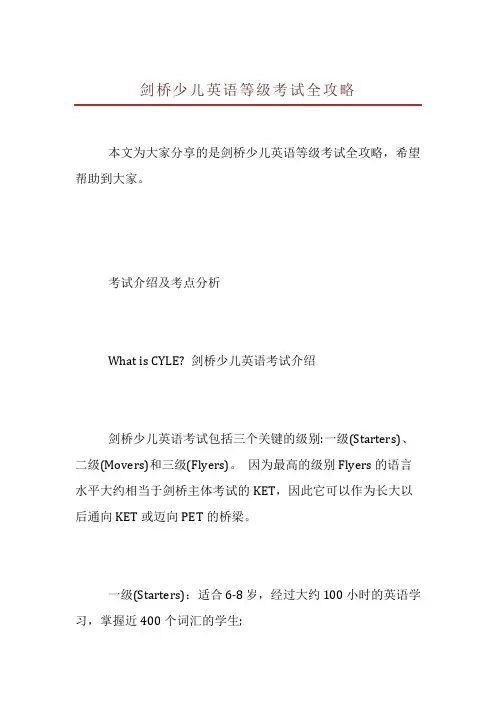
剑桥少儿英语等级考试全攻略本文为大家分享的是剑桥少儿英语等级考试全攻略,希望帮助到大家。
考试介绍及考点分析What is CYLE? 剑桥少儿英语考试介绍剑桥少儿英语考试包括三个关键的级别:一级(Starters)、二级(Movers)和三级(Flyers)。
因为最高的级别Flyers的语言水平大约相当于剑桥主体考试的KET,因此它可以作为长大以后通向KET或迈向PET的桥梁。
一级(Starters):适合6-8岁,经过大约100小时的英语学习,掌握近400个词汇的学生;二级(Movers):适合8-11岁,经过大约175小时的英语学习,掌握约600个词汇的学生;三级(Flyers):适合9-12岁,经过大约250小时的英语学习,掌握约1000个词汇的学生。
在中国由于考生的语言背景与其它国家的差异,剑桥少儿英语考试的年龄段扩展到6-12岁甚至更广。
不论参加过多少学时的训练,具有什么样的基础,都可以参加考试。
下表列举出三个级别考试的一般特性和区别:读写(Reading and Writing )这个部分是个笔试部分,时间为:20分钟(一级)到40分钟(三级)。
文字篇幅比较短小,由一些固定内容的单词和结构组成。
考生只需要进行简单的操作如选择和打勾,用单词和短语填空,回答灵活性的问题。
试卷被送往剑桥大学考试委员会打分。
听力(Listening)这个部分也是一个笔试部分。
时间为:20分钟(一级和三级),25分钟(二级)。
和读写部分一样,考试内容局限在考试指定的内容。
考生听简短的成人和儿童的录音对话,进行简单的操作如划线、选择、配对和填色。
试卷被送往剑桥大学考试委员会打分。
口试(Speaking)这部分是个面对面的持续约5到10分钟的考试。
考试由经验丰富的,经过培训的合格考官执行。
考生按照考官的视觉提示回答提问,提供自我的简单情况。
剑桥大学ESOL考试院推出的剑桥少儿英语考试为了鼓励考生,只要参加考试就发证书,成绩分为三项分别是听力、读写、口语,每项为五个盾牌总共十五个盾牌。
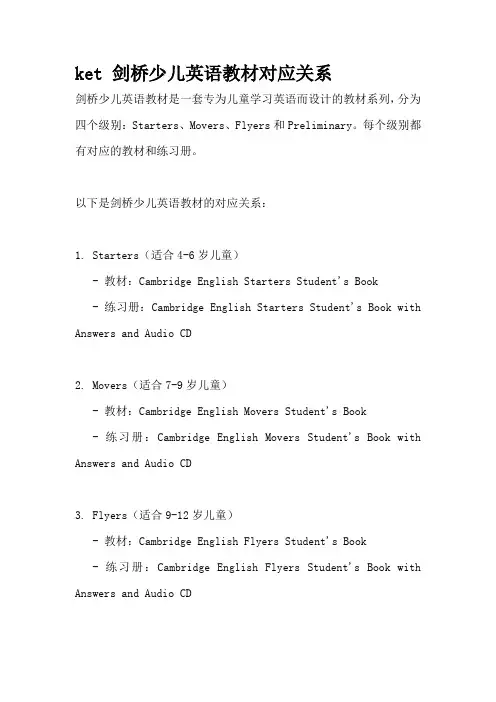
ket 剑桥少儿英语教材对应关系剑桥少儿英语教材是一套专为儿童学习英语而设计的教材系列,分为四个级别:Starters、Movers、Flyers和Preliminary。
每个级别都有对应的教材和练习册。
以下是剑桥少儿英语教材的对应关系:1. Starters(适合4-6岁儿童)- 教材:Cambridge English Starters Student's Book- 练习册:Cambridge English Starters Student's Book with Answers and Audio CD2. Movers(适合7-9岁儿童)- 教材:Cambridge English Movers Student's Book- 练习册:Cambridge English Movers Student's Book with Answers and Audio CD3. Flyers(适合9-12岁儿童)- 教材:Cambridge English Flyers Student's Book- 练习册:Cambridge English Flyers Student's Book with Answers and Audio CD4. Preliminary(适合12岁以上儿童)- 教材:Cambridge English Preliminary for Schools Student's Book- 练习册:Cambridge English Preliminary for Schools Student's Book with Answers and Audio CD这些教材和练习册都是由剑桥大学出版社出版的,可以在各大书店或在线平台购买。
animal 动物bat 蝙蝠butterfly 蝴蝶bird 鸟bear 熊camel 骆驼cat 猫cage 笼子dinosaur 恐龙chicken 小鸡dolphin 海豚extinct 灭绝的cow 奶牛fly 苍蝇fur 皮毛crocodile 鳄鱼jungle 丛林insect 昆虫dog 狗kangaroo 袋鼠nest 鸟窝duck 鸭子kitten 小猫octopus 章鱼elephant 大象lion 狮子swan 天鹅fish 鱼panda 熊猫wing翅膀frog青蛙parrot 鹦鹉giraffe 长颈鹿pet 宠物goat 山羊puppy 小狗hippo 河马rabbit 兔子horse 马shark 鲨鱼lizard 蜥蜴whale鲸鱼monkey 猴子mouse/mice 老鼠sheep 绵羊snake 蛇spider 蜘蛛tiger 老虎zoo动物园Starters 一级Movers 二级Flyers 三级AnimalsStarters 一级Movers 二级Flyers 三级arm 手臂back 后背body 身体beard 络腮胡ear 耳朵blond(e)金色的eye 眼睛blonde hair 金发face 脸bottom 臀部foot/feet脚curly 卷曲hair头发fair 美丽的;白皙的(肤色)hand 手fat 胖的head 头moustache 胡子(八字须)leg 腿curly moustache 卷曲的八字胡mouth 嘴巴neck 脖子nose 鼻子shoulder 肩膀smile微笑stomach 胃straight 直的thin 瘦的tooth/teeth牙齿bag 包coat 外套belt 皮带clothes 衣服scarf 围巾glove 手套dress 长裙sweater毛衣pocket 口袋glasses 眼镜ring 戒指handbag 手提包shorts 短裤hat 帽子spot 波点jacket夹克spotted波点的Starters 一级Movers 二级The body &FaceFlyers 三级jeans 牛仔裤stripe 条纹shirt 男士衬衫striped 条纹的shoe 鞋子tights 紧身衣skirt 短裙umbrella 雨伞sock 袜子uniform制服trousers 裤子T-shirt T恤watch 手表wear 穿black黑色的dark 深色的gold 金色的light淡色的blue 蓝色的silver 银色的brown 棕色的spot 波点color颜色spotted 波点的green 绿色的stripe 条纹gray(grey)灰色的striped条纹的orange 橙色的pink 粉色的purple 紫色的red 红色的white 白色的yellow黄色的ClothesColorStarters 一级Movers 二级Flyers 三级Starters 一级Movers 二级Flyers 三级baby 婴儿aunt姑:姨husband 丈夫boy 男孩daughter 女儿married 结婚的brother 兄弟granddaughter 孙女surname 姓氏child 孩子grandparent (外)祖父母中其中一人wife妻子children 孩子grandson 孙子cousin 堂(表)兄弟姐妹grown-up 成年人;成年的,成人的dad 爸爸parent 父母中其中一人family 家庭son 儿子father 爸爸uncle叔叔friend 朋友girl女孩grandfather 祖父grandma 祖母grandmother 祖母grandpa 祖父live 活着man/men 男人mother 妈妈mum 妈妈old 年老的people 人们person 人(单数)sister姐妹woman/women 女人Family &Friendsyoung 年轻的apple 苹果bottle 瓶子biscuit 饼干banana 香蕉bowl 碗butter 黄油bean 豆角cheese 奶酪candy 糖果(不可数)bread 面包coffee 咖啡burn 烧;燃烧breakfast 早餐cup 杯子chocolate 巧克力burger 汉堡glass 玻璃杯chopsticks 筷子cake 蛋糕hungry 饿的cookie 曲奇饼干candy 糖果meal 餐delicious 美味的sweet(s)糖果pasta 意大利面flour 面粉carrot 胡萝卜picnic 野餐fork 叉子chocolate 巧克力plate 盘子jam 果酱chicken 鸡肉salad 色拉knife 小刀coconut 椰子sandwich 三明治knife 小刀dinner 晚餐,正餐soup 汤pepper 辣椒,胡椒,胡椒粉drink 饮料,喝 a fly in soup 一只苍蝇在汤里piece片,块eat 吃tea茶pizza 披萨egg 鸡蛋 a cup of tea 一杯茶plate 盘子fish 鱼thirsty 渴的salt 盐food 食物vegetable蔬菜smell 闻,闻起来chips 薯条(英式)snack 零食fries薯条(美式)spoon 勺子fruit 水果sugar 糖grape葡萄sweet(s)糖果Starters 一级Movers 二级Food &DrinksFlyers 三级Drinksice cream冰淇淋taste品尝juice果汁lemon柠檬lemonade柠檬汁lime青柠檬lunch午餐mango芒果meat肉milk牛奶onion洋葱orange橙子pea豌豆pear梨子pineapple菠萝potato土豆rice大米,米饭sausage香肠supper晚餐tomato西红柿water水watermelon西瓜Starters 一级Movers 二级Flyers 三级better好多了chemist药剂师cold感冒chemist’s药店cough咳嗽cut切,割破;切口cry 哭dentist 牙医doctor 医生fall 落下earache 耳朵疼fall over 摔倒fine 好的,健康的ill 生病的headache头疼medicine药hospital 医院hurt受伤的hurt shoulder 伤到肩膀matter 事情nurse护士stomach-ache 胃疼,肚子疼temperature 温度,发烧tired 累的toothache牙疼apartment 公寓address 地址brush 刷,刷子armchair 扶手椅awake 醒着的;唤醒comb 梳子bath 洗澡,浴缸balcony 阳台cooker 厨具bathroom 浴室basement 地下室diary 日记bed 床blanket 毛毯;毯子fridge 冰箱bedroom 卧室downstairs 楼下key 钥匙bookcase 书橱dream 梦,梦想letter 信box 盒子dry 干的;擦干envelope 信封camera 照相机DVD player DVD播放机shelf架子chair椅子elevator升降电梯(美)soap肥皂HealthStarters 一级Movers 二级Flyers 三级clock钟fan扇子stamp邮票computer电脑floor地板swing秋千cupboard碗橱,柜子home家telephone电话desk课桌lift升降电梯(英)toilet卫生间dining room饭厅player播放器umbrella雨伞doll玩偶,洋娃娃plant植物door门pool水池flat公寓shower淋浴,淋浴头flower花stair(s)台阶garden花园toothbrush牙刷hall大厅towel毛巾The homehouse房子upstairs楼上kitchen厨房wash洗lamp台灯living room客厅mat垫子mirror镜子painting画phone电话picture图片radio收音机room房间rug小块地毯sleep睡觉sofa沙发table桌子television电视机toy玩具tree树TV电视wall墙watch观看window窗户card卡片glass玻璃gold金质的metal金属的paper纸质的plastic塑料的silver银质的wood木材;木质的wool羊毛behind在…之后carry拿;提;拎airport机场between在…之间above在上方bookshop书店here这里bank银行bridge桥in在…里面below在下方bus stop公交车站in front of …在…前面bus station 公交车站(终点站)castle城堡MaterialsStarters 一级Movers 二级Flyers 三级Starters 一级Movers 二级Flyers 三级next to 在…旁边bus stop 公交车站chemist(‘s)药房on 在…上面café咖啡馆circus 马戏团park 公园call 打电话club 俱乐部playground 操场centre 中心,中间college 学院store 商店city centre 城市中心corner 角落street 街道shopping centre 购物中心east 东边there 那里circle 原形end 最后under在…下面drop 落下;扔下factory 工厂library 图书馆fire station 消防局map地图front 前面a map of the world 一张世界地图gate 大门place 地方get to 到达farm 农场hotel 酒店hotel 酒店left 左边hospital 医院London 伦敦market 市场museum 博物馆near 在附近north 北边seat 座位over在上方square 广场;正方形police station 警察局station 车站post office 邮局straight 直的,直线restaurant 餐馆the first floor 一楼right 右边opposite 对面的south 南边cinema 电影院station 车站road马路straight on一路向前Places &Directionsslow 缓慢的;缓行,慢行,减速theatre剧院sports centre运动中心university大学supermarket超市way路swimming pool游泳池west西边alphabet字母表homework家庭作业art艺术answer回答mistake错误backpack背包ask问text课文,文本bin桶,垃圾桶board板broken损坏的book书club俱乐部bookcase书柜college学院class班级competition比赛classroom教室dictionary字典close关闭exam考试colour颜色flag旗帜computer电脑geography地理correct改正glue胶水cross十字,叉group组cupboard碗橱,柜子history历史desk课桌how long多长……door门language语言draw画maths(US数学do a drawing画画rucksack帆布背包English英语science科学Starters 一级Movers 二级Flyers 三级eraser橡皮擦scissors剪刀example例子shelf架子find找到student学生floor地板subject学科know知道teach教keyboard键盘turn on打开learn学习turn off关闭lesson课university大学letter字母line线listen听look看Schoolmouse鼠标music音乐number数字open打开page页part部分pen钢笔pencil铅笔picture图片playground操场question问题read读right正确的rubber橡皮擦ruler尺子school学校sentence句子sit(down)坐下spell拼写stand(up)起立story故事teacher教师tell告诉test考试tick勾,记号understand理解wall墙window窗户word单词write写Starters 一级Movers 二级Flyers 三级badminton羽毛球bat棒球棒chess国际象棋ball球CD CD concert音乐会baseball棒球CD player CD播放器crown皇冠basketball篮球cinema电影院diary日记beach海滩comic漫画drum鼓bike自行车comic book漫画书flashlight手电筒boat小船cry哭golf高尔夫book 书dance 跳舞hotel 酒店bounce 拍(球),弹跳drive(v)驾驶instrument 乐器camera 照相机dress up 打扮magazine 杂志catch 接DVD DVD光盘meet 遇见catch a ball 接球DVD player DVD播放器player 播放器doll 玩偶,洋娃娃email 电子邮件;给……发电子邮件postcard 明信片draw 画film/ movie 电影programme 节目drive 驾驶fish 鱼pyramid 金字塔enjoy 享受fishing 钓鱼race比赛favourite 最喜欢的go shopping 去购物tape recorder 录音机fishing 钓鱼hide 躲藏rucksack 帆布背包fly 飞holiday 假日passager 乘客football 足球(英式)hop 单脚跳score 分数game 游戏kick 踢ski(n+v)滑雪板;滑雪(用滑雪板)guitar 吉他laugh 大笑sledge 雪橇hit 打message 消息snowball 雪球hit a ball 击球music 音乐snowman 雪人hobby 爱好party 聚会snowboard 滑雪(用滑雪板)hockey 曲棍球pool 水池stage 舞台jump 跳present 礼物suitcase 行李箱kick踢quiet 安静的swing 秋千kick a ball 踢球ride(n)骑tape 磁带kite 风筝sail 帆船;航行team 队listen听skate溜冰tent帐篷Sports &Leisurepaint(ing)绘画skip跳,跳过;跳绳torch手电筒,火炬photo照片sports centre体育中心umbrella雨伞piano钢琴swim(v)游泳violin小提琴picture图片swimming pool游泳池volleyball排球play玩text 文本;发短信,发消息radio录音机towel毛巾read读书video 视频;录像,制作……的录像ride骑walk(n)走路run跑website网站sing唱soccer足球(美式)song歌曲sing a song唱歌sport运动story故事swim游泳table tennis乒乓球take a photo拍照television/TV 电视tennis网球text课文,文本throw扔throw a ball扔球,抛球&Leisuretoy 玩具walk走路,散步watch观看swim游泳Starters 一级Movers 二级Flyers 三级afternoon下午after之后 a.m.上午birthday生日always总是ago...之前clock时钟before之前April四月day天every每个August八月end最后Friday周五autumn秋天evening傍晚Monday周一calendar日历morning早上never从不century世纪night晚上Saturday周六Christmas圣诞节today今天sometimes有时date日期watch手表Sunday周日December十二月Thursday周四early早的Tuesday周二fall秋天Wednesday周三February二月week星期future将来weekend周末half一半,半小时yesterday昨天hour小时January一月July七月June六月late迟到Timelater 后来March 三月May 五月midday 中午midnight 午夜minute 分钟month 月份November 十一月o’clock ...点,整点October 十月p.m.下午past 过quarter 一刻钟September 九月spring 春天summer 夏天time 时间tomorrow 明天tonight 今晚winter 冬天year年alien 外星人bat蝙蝠ball 球comic book/comic 漫画书baseball棒球dolphin海豚Time Starters 一级Movers 二级Flyers 三级basketball 篮球 a farmar on his farm 一个农夫在农场上bike 自行车kangaroo 袋鼠boat 小船kitten 小猫咪car 汽车lion 狮子doll 玩偶,洋娃娃panda熊猫football足球(英式) a parrot in a cage 一只鹦鹉在笼子里game 游戏pet puppy 宠物小狗helicopter 直升飞机pirate 海盗kite 风筝rabbit 兔子lorry 卡车(英式)roof 屋顶,房顶monster 怪物roller skates 滚轴溜冰鞋plane 飞机shark 鲨鱼robot 机器人 a tall clown 一个高个子小丑soccer 足球(美式)whale鲸鱼toy 玩具train 火车truck 卡车(美式)bike 自行车bus station 公共汽车站airport 机场boat 小船drive(n)驾驶ambulance 救护车bus 公共汽车driver 司机bicycle 自行车car 小汽车ride(n)骑engine 发动机,引擎drive(v)开……; 驾驶……station车站fast 快的drive a car 开车ticket 票fire 火fly飞tractor拖拉机rocket火箭ToysStarters 一级Movers 二级Flyers 三级go 去;(交通灯-绿灯)行station 车站helicopter 直升飞机taxi 出租车lorry卡车(英式)traffic交通motorbike摩托车plane 飞机fly a plane 开飞机,驾驶飞机ride(v)骑ride a bike 骑自行车run 跑stop 停止;(交通灯-红灯)停swim 游泳train 火车truck 卡车(美式)sun太阳cloud 云fog 雾cloudy 多云的ice 冰rain 雨,下雨storm 暴风雪rainbow 彩虹foggy 有雾的snow 雪,下雪sky天空storm 暴风雨;暴风雪sunny 晴的weather天气Transport WeatherStarters 一级Movers 二级Flyers 三级wind 风windy有风的teacher 老师clown 小丑actor 男演员doctor 医生airport 机场driver 司机ambulance 救护车farmer 农场主,农民artist 艺术家hospital 医院astronaut 宇航员nurse 护士business 生意,事业pirate 海盗businessman 男商人work工作businesswoman 女商人circus 马戏团cook 厨师dentist 牙医engine 发动机,引擎engineer 工程师factory 工厂fire 火fireman 消防员firework 烟火footballer 足球运动员job工作journalist 记者king 国王man男人Work Starters 一级Movers 二级Flyers 三级mechanic修理工meeting会议newspaper报纸office办公室painter画家photographer摄影师pilot飞行员police station警察局policeman男警察policewoman女警察police officer警察queen女王,皇后rocket火箭secretary秘书singer歌手waiter男服务员waitress女服务员Starters 一级Movers 二级Flyers 三级beach海滩centre中心air空气bookshop书店city城市bridge桥park公园city centre城市中心castle城堡sand沙子country国家cave洞穴sea海countryside乡村desert沙漠shell贝壳field田野fire火shop/store商店forest森林future未来street街道grass草;草地environment环境sun 太阳ground 地面planet 行星tree 树island 岛屿pyramid 金字塔water水jungle 丛林sky 天空lake 湖space 空间leaf/leaves 树叶wood 木头moon 月亮hill小山mountain 山;山脉plant 植物river 河流road 马路rock 岩石star 星星station 车站top 顶部town 城镇village 村庄waterfall 瀑布world世界The world around us。
剑桥少儿英语flyer成绩单摘要:I.引言- 介绍剑桥少儿英语Flyers考试- 考试的重要性II.考试内容- 考试结构- 听力、阅读、写作和口语部分III.考试评分- 评分标准- 成绩等级IV.成绩单解读- 成绩单内容- 成绩单对学生发展的作用V.备考建议- 备考策略- 提高英语水平的方法VI.结论- 总结剑桥少儿英语Flyers考试- 强调成绩单的重要性正文:剑桥少儿英语Flyers考试是针对10-12岁儿童的一种英语能力测试。
该考试不仅能够检验学生的英语水平,还能为他们今后的学习和发展提供重要的参考。
在今天的文章中,我们将详细介绍剑桥少儿英语Flyers考试的相关内容。
II.考试内容剑桥少儿英语Flyers考试共分为四个部分:听力、阅读、写作和口语。
考试的结构旨在全面评估学生的英语能力,让他们在各个方面的技能都能得到锻炼。
III.考试评分剑桥少儿英语Flyers考试的评分标准非常严格。
每个部分都会根据学生的表现给出一个等级,最终成绩单上会显示四个部分的平均等级。
成绩等级分为A、B、C、D四个等级,其中A为最高,D为最低。
IV.成绩单解读成绩单是剑桥少儿英语Flyers考试的重要组成部分。
成绩单上会列出学生在每个部分的等级,以及总的平均等级。
通过分析成绩单,学生可以了解自己在哪些方面需要加强,哪些方面已经掌握得较好。
此外,成绩单也是学生英语水平的重要证明,对他们今后的学习和发展具有很大的参考价值。
V.备考建议为了在剑桥少儿英语Flyers考试中取得好成绩,学生需要提前做好充分的备考。
一方面,他们要掌握考试的内容和结构,了解每个部分的具体要求;另一方面,他们要通过大量的练习,提高自己的英语水平。
只有这样,他们才能在考试中取得理想的成绩。
总之,剑桥少儿英语Flyers考试是一种非常重要的英语能力测试。
通过参加这种考试,学生可以全面了解自己的英语水平,为今后的学习和发展找到方向。
少儿剑桥英语等级介绍在当今全球化的时代,英语作为一门国际通用语言,其重要性不言而喻。
对于少儿来说,从小打下良好的英语基础,不仅有助于他们在学业上取得优异成绩,还能为未来的发展开拓更广阔的空间。
少儿剑桥英语作为备受认可的英语学习体系,其等级划分明确,能够有针对性地帮助孩子们逐步提升英语能力。
接下来,让我们详细了解一下少儿剑桥英语的等级。
少儿剑桥英语主要分为三个等级:一级(Starters)、二级(Movers)和三级(Flyers)。
剑桥少儿英语一级(Starters)是基础阶段。
这个等级主要面向刚刚接触英语学习的少儿,旨在培养他们对英语的初步兴趣和基本认知。
在这个阶段,孩子们会学习一些简单的英语单词,如常见的动物、颜色、数字等。
同时,也会接触到一些基础的日常用语,例如问候、介绍自己、表达喜好等。
教学方式通常以生动有趣的游戏、歌曲和故事为主,让孩子们在轻松愉快的氛围中感受英语的魅力。
通过这个等级的学习,孩子们能够初步建立起英语学习的信心,为后续的学习打下基础。
二级(Movers)则是在一级的基础上有所提升。
孩子们在这个阶段会接触到更多的词汇和语法知识,开始学习简单的句子结构和时态。
例如,一般现在时、现在进行时等。
他们能够用英语进行简单的交流,描述日常生活中的一些事情。
阅读和写作方面也会有初步的要求,比如能够读懂简单的短文,并尝试书写一些简短的句子。
此阶段的学习更注重培养孩子们的语言运用能力和思维能力,让他们能够在实际情境中灵活运用所学的英语知识。
三级(Flyers)是少儿剑桥英语的较高等级。
在这个阶段,孩子们的英语水平会有一个较大的提升。
词汇量进一步增加,语法知识更加丰富和复杂,包括过去时、将来时等时态的学习。
阅读和写作的难度也相应提高,孩子们需要能够读懂较长的文章,并能够写出有一定逻辑和内容的短文。
听力和口语方面,要求能够听懂较为复杂的对话,并进行较为流畅的交流。
达到这个等级的孩子,已经具备了一定的英语综合能力,可以为进一步学习更高难度的英语课程做好准备。
剑桥少儿英语介绍一、简介剑桥少儿英语(Cambridge Young Learners English Tests)是由剑桥大学考试委员会(Cambridge Assessment English)为全球非英语母语的6-12岁少年儿童设计的一套权威的国际标准化英语水平认证体系。
二、适用年龄剑桥少儿英语适用于6-12岁的学生,共分为三个级别:一级(Starters)、二级(Movers)和三级(Flyers)。
三、等级划分剑桥少儿英语的等级划分以学生的英语水平为依据,每个级别都有相应的英语水平要求。
通过考试的学生将获得由剑桥大学考试委员会颁发的证书,以证明其英语水平。
四、课程特色1. 注重听说能力的培养,让学生在实际交流中提高英语水平。
2. 课程内容生动有趣,结合学生的日常生活,使其更加容易理解和记忆。
3. 培养学生的跨文化意识,使其更好地适应国际化的社会环境。
五、学习方式剑桥少儿英语的学习方式灵活多样,可以结合学生和家庭的实际需要进行选择。
包括在线学习、自学教材、培训班等形式,同时也有大量的英语学习资源和活动可供学生参加。
六、考试剑桥少儿英语的考试包括听、说、读、写四个部分,全面考察学生的英语能力。
考试的形式和标准与剑桥大学考试委员会的其他考试一致,以确保考试的公正性和准确性。
七、用途剑桥少儿英语证书在很多方面都有用途。
首先,它可以作为学生在国际学校或国外中学申请的参考依据。
其次,持有剑桥少儿英语证书的学生更容易获得国外大学的奖学金或免修部分英语课程。
最后,对于参加中考、高考以及研究生入学考试的学生来说,剑桥少儿英语证书可以在一定程度上提高学生的英语成绩。
此外,许多企业和公司在招聘时也会将剑桥少儿英语证书视为应聘者英语能力的证明之一。
八、结语总的来说,剑桥少儿英语不仅能够帮助学生在全球化的社会环境中更好地交流和学习,还能为其未来的教育和发展打下坚实的基础。
无论是在国内还是国外,拥有剑桥少儿英语证书的学生都将拥有更多的机会和选择。
,. Flyers重点 Unit1 识记词汇 subject Maths Science History English Chinese Geography Art Music secret rich poor without 了解词汇 route step stick 句型 1. What is your/his/her favorite subject? My/His/Her favorite subject is …… 2. What classes do you/they have? I /They have….classes and ….classes. 3. What classes does he/she have? He/She has….classes and ….classes. 背诵第8部分 Unit2
识记词汇 January February March April May June July August September October November December present 了解词汇 date choose surely born 语法 介词in和on 在具体日期及月份前的用法 句型 1. When is your/his/her birthday? It is in 月份. / It is on 具体日期. ,. 2. What is your wish? I wish that I could…… Unit3
识记词汇 fog foggy storm stormy fall stay bring light (复习词汇cloud cloudy wind windy rain rainy snow snowy sunny ) 了解词汇 raindrop band blonde 语法 复习一般过去时 句型 What was the weather like yesterday/last week? It was 天气状况。 背诵第2部分 Unit4
识记词汇
taxi street university turn minute other anywhere distance square palace centre foreign subway go straight turn left/right 了解词汇 The Summer Palace The Fragrant City The Forbidden City Tian′anmen Square 句型 ,. 1. How far is it from Beijing to Tianjin? It is 92km from Beijing to Tianjin . 2. How long does it take by taxi? It takes about 30 minutes. 背诵第2部分 Unit5
识记词汇 golf drum rucksack sledge suitcase torch pyramid already finish tent diary camp 了解词汇 robot helper finger 语法 复习现在完成时(have/ has+过去分词)和讲解被动语态(be+called) 句型 1. Have you ever played golf ? Yes, I have. / No, I haven′t. 2. What is it called ? It is called golf. 3. What are they called? They are called robots. 背诵第1部分 Unit6
识记词汇 silver metal dinosaur wool feel smell taste chocolate chopsticks knife toilet sound 了解词汇 octopus striped ring saucepan member roast rubber goodness ,. 语法 对感观动词的讲解和运用(sound taste look feel smell ) 句型 What does it +感官动词+ like? It +感观动词的第三人称形式+like….. 背诵第3部分 Unit7
识记词汇 cave castle hut apartment balcony upstairs downstairs travel town remember (复习bedroom bathroom dining room living room) 了解词汇 town house floating house traveling house mobile house 语法 宾语从句的简单讲解 句型 What is your + 房间+ like ? Does it have a….. ? 练习并背诵第2部分 Unit8
识记词汇 time use air fire future quarter flyer robot bridge world village space walk half The Great Wall of China World Wide Web London Bridge 了解词汇 ,. Global Village space walk sandglass candle clock weight driven clock spring driven clock pendulum clock 语法 时间的表示方法: 1. 整点的表示法 小时+ o′clock 几点整 2. 半点前的表示法 分钟 + past + 小时 几点过几分 3. 半点后的表示法 分钟 + to + 小时 差几分几点 4. 一刻钟的表示法 a quarter past + 小时 几点十五分 a quarter to + 小时 差十五分几点 5. 半点整表示法 half past + 小时 几点半 6. 直接表示法:直接按照顺序说出小时和分钟的数字即可 句型 1. What is the time ? It is + 时间 2. When do you usually do sth ? I usually do sth at + 时间. 3. When does she/he usually do sth ? He/She usually do (动词用第三人称)sth at + 时间. 背诵第1部分 Unit9
识记词汇 museum bookshop swan anything camel waterfall science enjoy hope idea mean countryside Australia summer post office 句型 ,. 征求对方意见时的句型:Shall I/we do sth ? (该句型中的人称只能用第一人称) 背诵第1部分 Unit10
识记词汇 airport chemist club station police restaurant tape recorder jam businessman college fire London fridge freezer crowd indeed police station fire station 语法 复习现在完成时(have/ has+过去分词) 如何将现在完成时的肯定句变成一般疑问句 句型 1. I have ever opened the window. → Have you ever opened the window ? 2. He/She has ever written a letter. → Has he/she ever written a letter ? 3. I have ever been to an airport. → Have you ever been to an airport ? 4. He/She has ever been to a museum. → Has he/she ever been to a museum? 5. Have you ever played the piano ? Yes, I have. / No, I haven′t. 6. Has your father ever been to Wuhan? Yes, he has. / No, he hasn′t. 背诵第3部分 Unit11
识记词汇 plastic wood metal glass wool silver other plate shelf fork ,. scissors spoon glove empty happen expensive noisy hard heavy cheap special cupboard cooker shell seashore weak material telephone coat 了解词汇 recycle reuse useless 语法 讲解被动语态(be made of 由。。。。。制成) 句型 1. What′s the clock made of ? It′s made of metal . 2. What are chopsticks made of ? They are made of wood . 背诵第1部分 Unit12
识记词汇 gold high tennis environment interest athlete medal high jump long jump dive water polo boxing rowing skating sailing volleyball shooting cycling hockey handball wrestling protect volunteer historical 复习词汇 football basketball soccer table tennis badminton golf swimming fishing baseball running 语法 can是情态动词,后用动词原形。